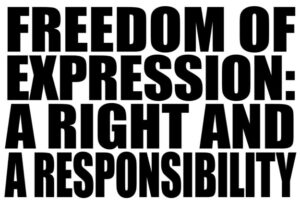Headlines
Mitchell: Freedom of Expression Not Easy, but Not Optional
The issue with free expression is not whether media people get killed. The issue is that without free expression, civilizations fail.
Free expression is not about reporters or even weird cartoons. It’s about each of us. People progress when thoughts — even unsavory thoughts — can be expressed without fear.
Don’t believe it? Think the news channels have been going overly berserk only because more of their own have been murdered? If so, ask your favorite historian this question: Going back a couple of thousand years, what have the most prosperous societies had in common? The answer is, “People have been able to exchange ideas.”
In a way, this column is about the calculated and heinous decision to murder magazine employees in Paris by those who believed their religion’s prophet had been mocked.
But it’s bigger than that.
And it’s closer to home.
The five freedoms — speech, petition, assembly, religion and the press —were not included in the First Amendment to protect Baptists or journalists or any other single group or interest. When you read what the authors of the U.S. Constitution had to say, it becomes apparent they believed these First Amendment guarantees would, in addition to limiting government and maximizing individual liberty, foster broad well being among the people.
Not matter how troublesome.
And it has worked.
Not seamlessly. Not perfectly.
But it has worked.
“Despotism can only exist in darkness,” is how James Madison put it.
Few, especially in the non-Muslim world, think killing people for drawing pictures, writing words or giving speeches is justifiable.
But while radical terrorists take their beliefs to such extremes, there are lesser attempts to suppress. They are much more common. They can have insidious consequences, too.
Some college campuses in the United States — which should be the least likely places where ideas are discouraged — have become forefronts of deciding what expressions are acceptable.
“Speech codes” are enacted with the best of intentions. A more harmonious world where people respect each other and are free from prejudice and bigotry is much to be desired. The question is how to get there. Violence and threats of violence should be punished, but telling one group its views can be written or spoken and telling others they must remain silent or face punishment is not.
If the First Amendment were being written today, the consensus might be that freedom of the press was included because CBS and CNN, Fox and The New York Times paid lobbyists a bundle. But a historian looking at the record will tell you in an instant that the first batch of American politicians were as aggravated — really aggravated — by the media as all since.
Three quotes from Thomas Jefferson illustrate this, and the challenge that is inherent when expression is not controlled based on its content.
“Were it left to me to decide whether we should have a government without newspapers, or newspapers without a government, I should not hesitate to prefer the latter,” is the Jefferson quote the media likes best.
But the truth is that Jefferson loathed newspapers. “Nothing can now be believed which is seen in a newspaper,” is one of his milder criticisms. “Truth itself becomes suspicious by being put into that polluted vehicle.”
It’s just that he knew allowing people, including media people, maximum freedom was a smarter alternative than have a government or any power parse acceptability based on whether an expression was popular.
Here’s where Jefferson came down: “It is so difficult to draw a clear line of separation between the abuse and the wholesome use of the press, that as yet we have found it better to trust the public judgment, rather than the magistrate, with the discrimination between truth and falsehood. And hitherto the public judgment has performed that office with wonderful correctness.”
Jefferson says we don’t have to like the words, ideas or expressions of others. He certainly didn’t. We might even find them loathsome. But he trusted the public to decide, on the whole, truth from falsity and good from evil.
Freedom of expression — freedom of the press — is not about the press. It’s about whether we make our own decisions, or whether we let someone else make them for us.
When you think about the murders in Paris or other attempts to chill what others say or do, think, again, about Madison: “Despotism can only exist in darkness.”
Charlie Mitchell is a Mississippi journalist and assistant dean of the Meek School of Journalism and New Media. Write to him at cmitchell43@yahoo.com.


















You must be logged in to post a comment Login